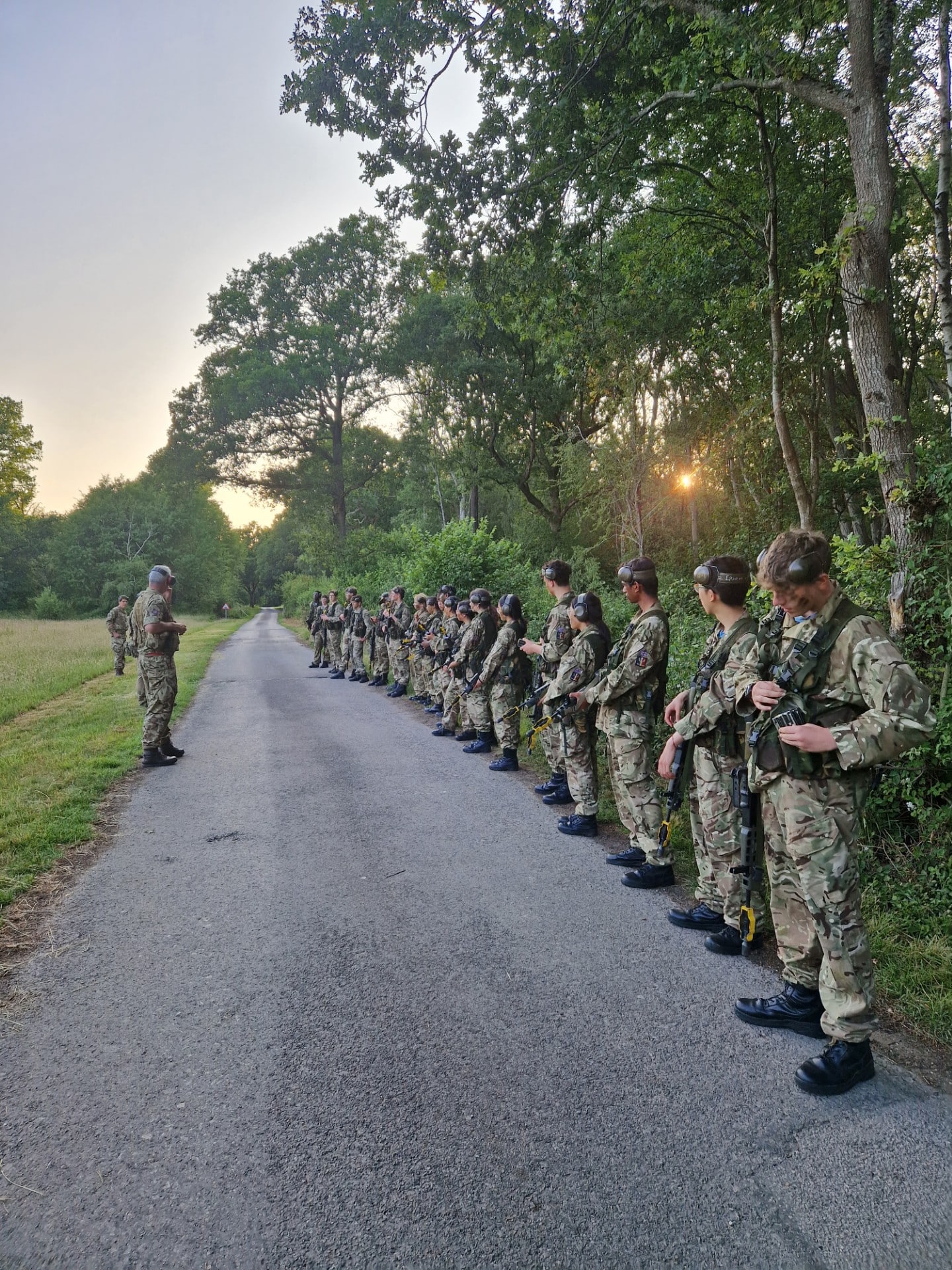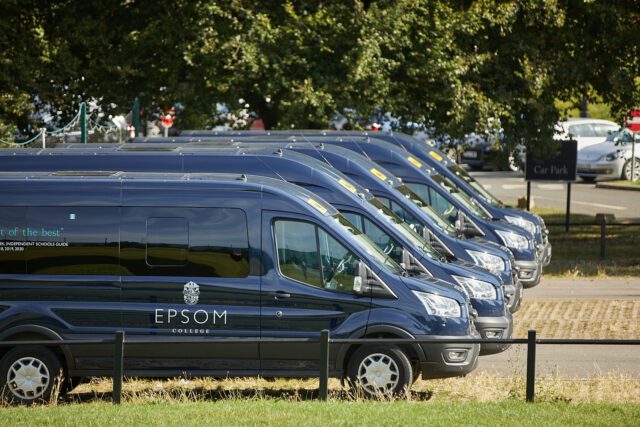Royal Navy Summer Camp 2025
This summer, cadets from the CCF Royal Navy section embarked on an unforgettable three-day adventure packed with seamanship, naval training, and teamwork.
The cadets launched from Hasler Marina in Gosport, where cadets crewed three vessels: the motorboat Black Swan and the yachts Bellerophon and Amaryllis. Sailing crews honed their skills in setting sail, tacking and jibing, with a scenic lunch stop at Seaview on the Isle of Wight. Meanwhile, the Black Swan crew focused on navigation, Seal spotting near West Wittering and practicing man overboard drills.
Cadets visited HMS Excellent, a key Royal Navy training base. Dressed smartly in full PCS, they received a briefing on naval security roles before engaging in a hands-on session clearing marine compartments—training that tested their ability to stay calm and think quickly under pressure. The afternoon featured high-tech simulations using the Virtual Battle Space system, where cadets piloted aircraft and marine vessels in rescue and transport missions.
The final day took place at Island Barn Reservoir, where cadets built on their RYA dinghy sailing skills. The day included fun and competitive activities like the whistle game, relay races, and follow-the-leader, reinforcing teamwork and agility on the water.
Throughout the camp, cadets demonstrated enthusiasm, resilience, and a strong willingness to learn. Their efforts were supported by the dedicated staff team: SLt Ellis, SLt Denny, Ms Kelly, and Miss Morris.
This summer camp was not only a chance to develop nautical and leadership skills but also a memorable experience that brought cadets closer to the spirit of the Royal Navy.
Nick Smith Head of CCF Royal Navy

![]()
![]()
![]()
![]()
![]()
![]()
![]()
![]()
Royal Air Force Summer Camp 2025
The RAF Section of the CCF recently completed a highly successful and immersive three-day summer camp at Bramley Training Ground. Cadets displayed exceptional enthusiasm and teamwork throughout the camp, fully embracing the challenges of fieldcraft, outdoor living, and simulated military operations.
The camp began with cadets departing from CCF HQ, collecting essential kit including their rifles and ration packs, before heading to the field. Upon arrival, they established a harbour area and set up their bashas, makeshift shelters using tarpaulin, which would be their sleeping quarters for the duration of the camp.
Over the three days, cadets engaged in a wide range of practical and theoretical exercises aimed at developing their fieldcraft and operational skills. These included:
- Patrolling and Hand Signals: Practising silent communication and group movement in a tactical environment.
- Reaction to Enemy Fire (RTR): Learning and applying the principles of ‘Return fire, Take cover, Return appropriate fire’ during contact drills.
- Firing and Withdrawal Formations: Drills included fire and manoeuvre tactics to withdraw from enemy engagement safely.
- Blank Firing Exercises: Putting training into practice in controlled scenarios simulating real combat using blank ammunition.
- Defensive Scenarios and Recon Spotting: Cadets participated in simulated battlefield situations requiring coordination between RAF sections to defend locations and identify opposing reconnaissance patrols.
- Final Day Ambush: The culmination of training saw the cadets engage in a coordinated defence against an army assault, demonstrating everything they had learned by initiating and breaking contact, and eventually forcing a withdrawal from both sides.
Despite the physical and mental demands of the camp, cadet morale remained remarkably high. A sense of camaraderie was fostered during communal outdoor cooking sessions, where cadets used portable stoves and fuel tablets to prepare their meals. They were provided with MOD-issued ration packs, which they found both intriguing and enjoyable. Food items were often traded among cadets based on preference, further strengthening group bonds.
During downtime, cadets showed creativity by improvising a cricket bat from a tree twig and playing cricket with a tennis ball, a testament to their adaptability and team spirit.
All cadets showed resilience by surviving three days without mobile phones, sleeping under bashas in open conditions, and participating in back-to-back training exercises. Despite the exhaustion at the end, every cadet emerged with a sense of achievement and pride.
The summer camp was a resounding success, providing cadets with an authentic, challenging, and rewarding RAF field experience. Their ability to work together, adapt to unfamiliar situations, and maintain a positive attitude was commendable. The camp concluded with a well-earned BBQ lunch and a return journey home, with cadets leaving with new skills, stronger friendships, and lasting memories.
Fg Off Singh Singh
Army Summer Camp Report
U4th and L6th pupils and staff from the Epsom College CCF Army and RAF sections boarded coaches to travel to the wilds of the Bramley Training Centre, for three days of fieldcraft training and blank firing exercises. Located in three separate harbour areas, sleeping in bivvy bags under bashas and cooking their own rations, the groups were fully self-sufficient throughout (until the welcome arrival of the school catering team with a BBQ lunch on Wednesday!).
Across the three days, the respective sections focused on developing their syllabus knowledge and skills in the field, learning about effective fire and manoeuvre strategies, section battle drills, breaking contact drills, section attacks, observation posts and close target recces, target indication and fire control orders, movement at night, patrolling, field signals and.. the list goes on! The Army section also squeezed in their air-rifle weapon handling tests and subsequent syllabus shoots, as well as a consolidation of their learning about ‘being stealthy’ on the first night by trying to avoid their florescent stripes being lit-up by their recce targets (armed with UV torches!) in the dark. The RAF very much enjoyed the activity of trying to spot Army recce parties whilst on patrol around their positions of interest the subsequent night.
The final exercise on Wednesday was a dramatic culmination of all the training over the previous days, with both Army Platoons tasked with reclaiming key sites from the RAF. The final sequence pitched six Army sections against three RAF groups, and the skirmishes passed around abandoned helicopters, through bridges under train lines, across fields, through trenches, and farm buildings, past concrete slabs and through woodland before the groups were finally satisfied that the job was done.
Despite the heat, the pupils performed superbly, and we were delighted to welcome the Headmaster, who was able to observe objectively the final exercise from both sides of the conflict! Supported by an outstanding team of staff, comprised of both teaching staff and our external CFAVs, the pupils have made enormous progress in a challenging environment, leaving the site tired, but in good spirits, and we are very, very proud of them. Well done and thankyou to all involved.
Clare Jeens





